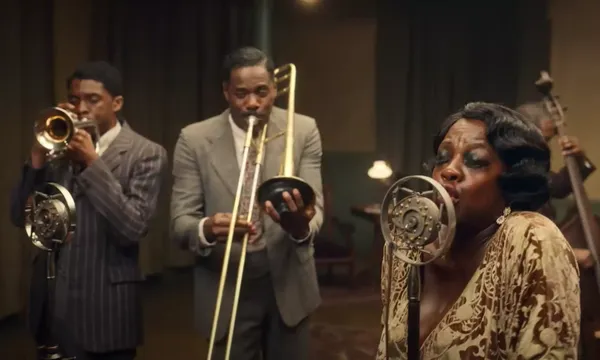Eye For Film >> Movies >> Ma Rainey's Black Bottom (2021) Film Review
Ma Rainey's Black Bottom
Reviewed by: Jennie Kermode

As anyone who has worked in the music industry knows, it's not a place where individual creative artists tend to be highly valued. How much more so when that artist is black and female in 1920s Chicago. "They don't care about me. They only want me for my voice," says Ma Rainey (Viola Davis) in Ruben Santiago-Hudson's adaptation of the August Wilson play. She's not the sort of woman to put up with being messed around, however, and leverages what power she has to ensure that things are done on her terms.
Rainey belonged to a different musical tradition - one built entirely around touring, with the artist exercising much more control. She was a legend in her time but died penniless after spending her last few years doing domestic work for white people. That her work has survived at all is only due to recording sessions like this, and they were arguably the same thing that killed her career. Davis' powerhouse performance delivers something of the immortality she bought that way, and the actress clearly relishes the opportunity to play someone who is both glamorous and what men like to refer to as difficult. Some viewers will find that she instantly gets their backs up, but pay attention and you'll see the effort that it's taking, the pressure that has forced Rainey to resist in every way she can.

One character like this is enough to dominate a film - or a band. The presence of a second sets up a situation in which, from the outset, we know something's got to give. This is Levee (Chadwick Boseman in his final and probably best performance), a man who has experienced the pressures of inequality in his own way and is still trying to find his own way of resisting or of acquiring and using power. As a trumpet player he knows he's not as indispensable as Rainey is. He chafes at being forced to cater to her whims and also at the treatment he receives from the studio, especially as he spends much of the film caught between them. Everyday life is filled with abuse and threat. A simple trip across the road to get Rainey a coke attracts murderous glares from white men - and Levee bears a scar left by a racist assailant who assaulted his mother.
Rainey is an experienced player. Everything, from her unabashed swagger to the pretty young woman on her arm, is both honest and calculated - she knows exactly how far she can go. Levee does not. He almost seems to disdain the lessons life has taught him as he bubbles with rage, even daring to flirt with Rainey's girlfriend. For most of the film's running time that rage is suppressed but Boseman lets us see it nonetheless, inviting viewers to share Levee's pain and anger even as the young man turns on the charm for those around him. It's fine swansong, though the extent to which critics have read it as an expression of Boseman's own feelings about his cancer does him a disservice. This is carefully crafted work and a demonstration of his talent.
The film's origins on stage remain visible and at times it moves awkwardly. The big speeches strain against their surroundings as if they, too, feel suffocated by the way they have been positioned. It's hard to watch this without being constantly aware of it as a piece of art, hard to focus instead on the story and themes that Wilson wanted to communicate. The standard of the acting does a lot to make up for this, however, and the production design is also impressive, against creating a sense of claustrophobia and drawing our attention to the juxtaposition of traditional styles with a rapidly changing world.
We are told the tale, here, of a man who did a deal with the Devil, whilst Levee is offered a deal himself: abandon his own ambitions as a performer and write songs for white musicians to play. There's a suggestion that for the black characters, such compromises are the only means through which to acquire the privilege that white men have, which rather suggests that the white men have been dealing with the Devil all along. Rainey knows what she's dealing with, and perhaps this knowledge is part of what powers her music. In a world where everything is broken down by the forces of racism and commercialism, she knows where to draw the line, how to hang on to something that's her own.
Reviewed on: 02 Feb 2021
















